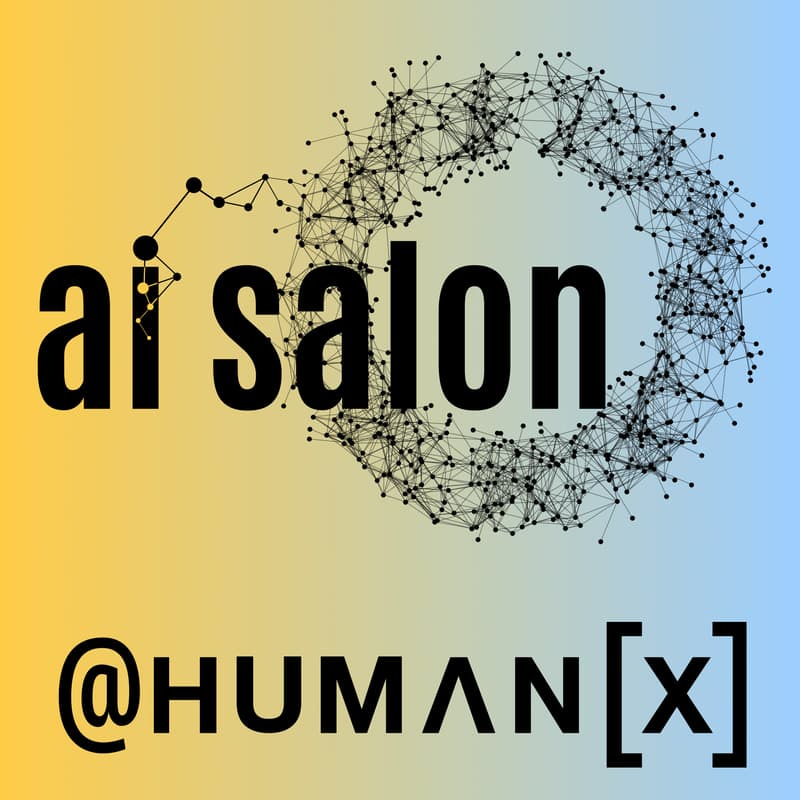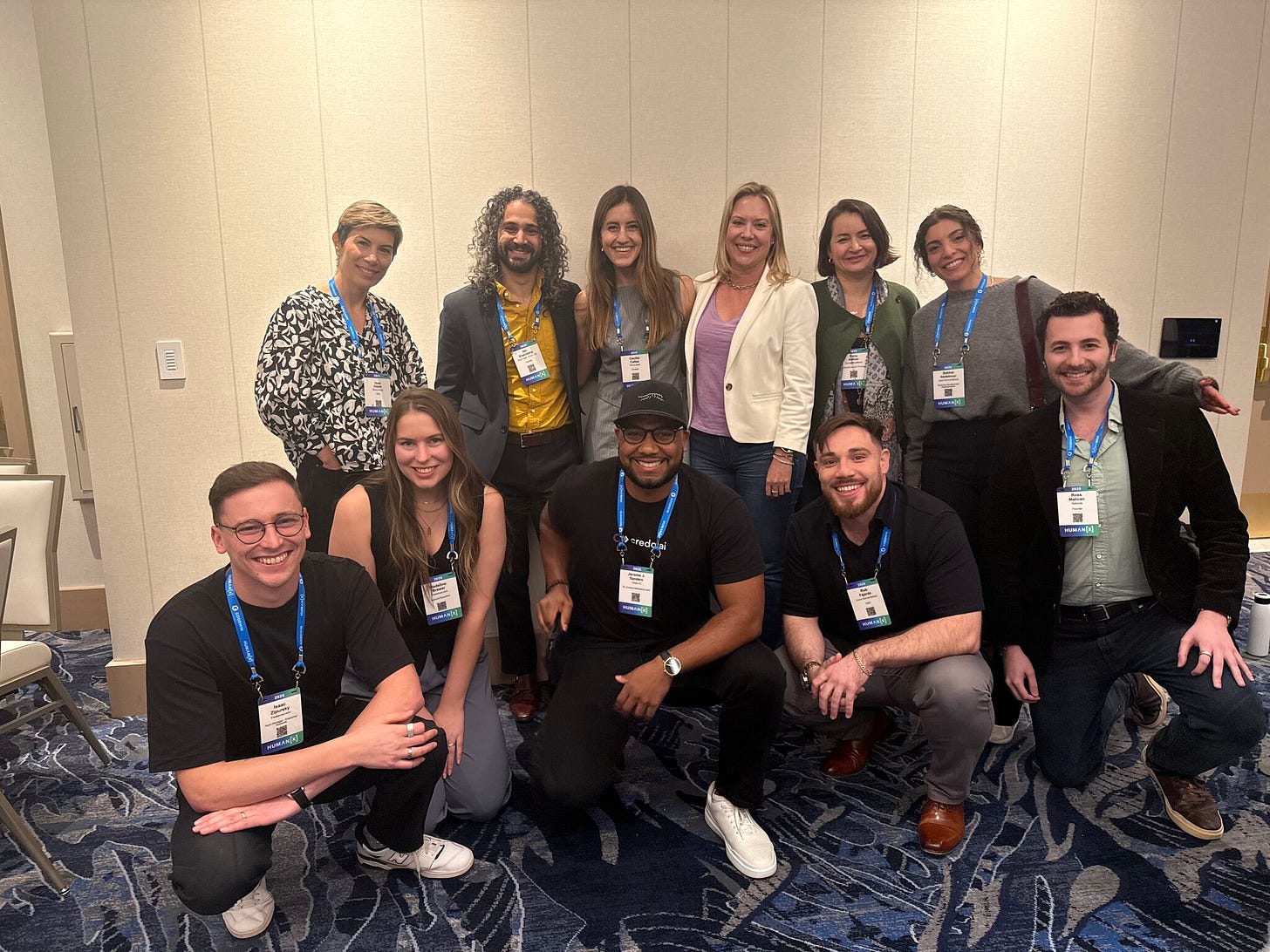🎧 AI-generated podcast derived from this blog using NotebookLM
HumanX was an interesting conference. As a focal point of enterprise AI conversation it reflected the AI hype suffusing the startup and investment space. Simultaneously, many attendees and talks consistently mentioned “trust”, a nebulous concept that is a critical component of a successful AI future for humans and businesses.
The Ai Salon attended to provide conversation space for the attendees. A dedicated space to digest the high-level talks, the expo pitches, and the fragmented insights overhead in hallways. We also believed that enterprise builders represent a critical component of the AI landscape and wanted to hear the thoughts of a new gathering of builders with attendees from around the country. During the three evenings of the conference in Las Vegas (March 10-12, 2025), we hosted conversations that moved beyond technical details and business realities to examine deeper questions about AI's impact on our collective future.
What emerged was of a piece with many of the conversations we have had over the last few years. It’s clear that as AI becomes a business imperative, and as more people enter the space, we will iteratively reflect the same themes and ideas continuously. This is the nature of our shifting time - the questions are humongous and fundamental, and need to be asked again and again.
The Salons: A Brief Overview
Salon 1: The Future of Work explored the tension between human augmentation and automation, revealing a fundamental question: Is AI augmentation merely a transient phase before complete automation, or can we create sustainable human-AI partnerships? Participants discussed the growing capability gap between AI adopters and non-adopters, how workforce dynamics are shifting, and whether current economic structures can adapt to these changes.
Salon 2: Governance & Control tackled the complex challenge of governing rapidly advancing AI systems. The conversation revealed competing frameworks for governance—from risk mitigation to comprehensive decision-making systems—and highlighted tensions between profit-driven development and responsible innovation. Participants grappled with questions of accountability, international cooperation, and the concentration of power in the hands of a few technology companies.
Salon 3: AI 2050 looked further into the future, examining how AI might transform everything from healthcare to human relationships by mid-century. The discussion revealed a profound paradox: technological advancement doesn't automatically translate to human flourishing. While AI may solve pressing material problems (from cancer to climate change), ensuring these advances enhance rather than diminish human experience requires intentional design and wisdom.
Cross-Cutting Themes
1. The Human-AI Relationship: Augmentation vs. Replacement
Across all three salons, participants wrestled with the fundamental question of how humans and AI will relate to each other. Will AI primarily enhance human capabilities or replace them? The first salon highlighted how AI is creating both opportunities for augmentation and pressures for replacement in the workforce. As one participant noted:
"I can see the gap that's forming between myself and my colleagues that are not augmenting themselves with AI... However, I'm wondering if this augmentation is a temporary way station along the road to full automation."
The most optimistic visions saw AI and humans complementing each other's strengths, while pessimistic scenarios foresaw widespread displacement with inadequate social systems to handle the transition.
2. Power, Data, and Governance
All three salons touched on how AI is reshaping power dynamics in society. Data emerged as a critical resource—"the new land" that entities compete to control. As one participant in the third salon observed:
"Data is going to be the new land. Like in the medieval time, where you had kings that were fighting over or kingdoms that were fighting over land because that made you powerful."
The second salon highlighted how current governance approaches often treat AI as merely a risk to be mitigated rather than a comprehensive framework for decision-making that weighs both benefits and risks. A recurring concern was the concentration of AI development among homogeneous groups with limited consideration of diverse perspectives.
3. The Technical-Social Balance
Each salon emphasized that AI challenges are not merely technical but deeply social and ethical. The first salon highlighted how market incentives often reward rapid development over responsible governance. The second salon examined the disconnect between technical solutions and social frameworks. The third salon explored how technological capability doesn't automatically translate to human happiness.
This led to important questions about how we design AI systems to enhance collective human flourishing rather than just individual prosperity. A particularly evocative vision from the third salon described a "solarpunk" future where technology enables rather than replaces authentic human connection.
4. Global and Demographic Variations
All three conversations acknowledged that AI's impact varies dramatically across geographic regions, demographic groups, and sectors. The first salon noted how AI adoption creates new divides between early adopters and those resistant to or unable to adapt. The second salon highlighted different governance approaches between Global North and South, with rights-based and risk-based frameworks often in tension. The third salon explored how the democratization of technology might enable global access to AI advances, particularly benefiting regions with historically weak institutions.
Looking Forward
The challenges/opportunities uncertainty was on full display during these conversations. While technological advancement continues at unprecedented speed, our social, economic, and governance structures struggle to keep pace. The key insight across all three evenings was that intentional design—of technologies, institutions, and social frameworks—will determine whether AI enhances or diminishes human flourishing.
As we move further into the AI era, spaces like the AI Salon become increasingly vital for bringing diverse perspectives together to navigate these complex questions. The salons demonstrated that our collective future with AI isn't predetermined by the technology itself, but will be shaped by the values, choices, and institutions we build around it.
This blog provides an overview of three evening conversations at HumanX 2025. For deeper exploration of each topic, please see our detailed blogs covering The Future of Work, Governance & Control, and AI 2050.








